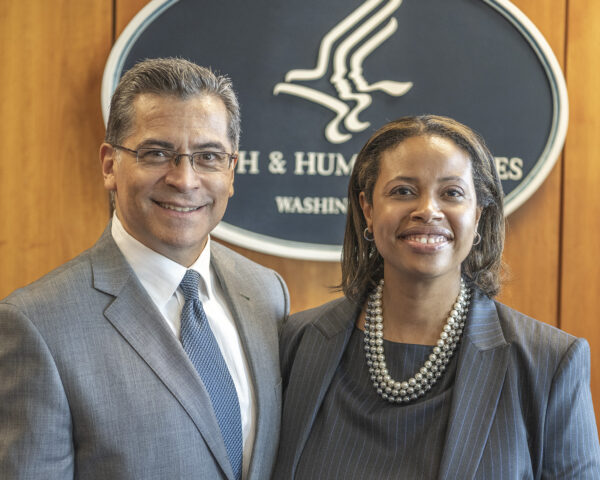
HHS Secretary Xavier Becerra and Chiquita Brooks-LaSure at her swearing in ceremony on May 27.
Last week, U.S. Senators narrowly confirmed Chiquita Brooks-LaSure as administrator of the Centers for Medicare & Medicaid Services (CMS), entrusting this veteran health policy advisor with the critical role that has been vacant since Seema Verma stepped down in January.
As CMS administrator, the 46-year-old Brooks-LaSure will oversee roughly $1 trillion of the federal budget and key programs such as Children’s Health Insurance Program (CHIP) and the Affordable Care Act’s (ACA) health insurance marketplaces. She is well-known in the beltway, having served as health policy advisor to Congress as well as three presidents: Bush Jr., Obama, and now, Biden.

Tackling Rising Drug Costs and Growing Popularity of GLP-1’s
See how Quantum Health is providing the steps to help their members tackle the cost of specialty medications and other drugs.
In a phone interview, Matthew Hittle, a former senior advisor of Verma, described Brooks-LaSure as someone who doesn’t hold any grudges against any particular industry. That is significant in an era of rampant partisan rancor, where people in positions of power are bent on forwarding their political or personal agenda. Hittle, who is now senior policy advisor at Akin Gump Strauss Hauer & Feld LLP, says he expects Brooks La-Sure to serve as a collaborative, informed administrator, albeit one with a lot on her plate.
A knack for process and collaboration
Hittle lauded her wide-ranging experience and willingness to listen to a wide range of stakeholders, describing them as key strengths needed in the role.
“Brooks-LaSure doesn’t really have a track record of grudges against any particular industry,” Hittle said in a phone interview. “She will likely be focused on priorities the administration has laid out in terms of expanding coverage, but it’s also fair to say the administration and Congress have put a lot on her plate to start, like a quick timeline for surprise medical billing rules.”
The No Surprises Act, passed in the 2020 year-end omnibus spending bill, will take effect in January of 2022. It’s aimed at cracking down on surprise medical billing that typically arises when patients in an emergency room are often treated by physicians outside their insurer’s network, leading to large bills that the insurer won’t pay. CMS is supposed to draft rules and policies that enforce it. That is a process in which the new administrator should seek and incorporate stakeholder feedback, Hittle advises.

Changes in Nurse Staffing Answer Clinician Demands
The ongoing nursing shortage facilitates high turnover rates since nurses know they won’t have difficulties finding new jobs. In order to retain and attract staff, it’s in a facility’s best interest to understand what nurses want.
“From the perspective of someone who’s been in the building, experience is always good because it helps you hit the ground running on the first day,” Hittle said. “That being said, it will be important for her to get ongoing, robust stakeholder engagement on the order of what CMS did during the height of the pandemic, such as weekly calls with stakeholder groups.”
Before joining Manatt Phelps & Phillips LLP in 2016, Brooks-LaSure spent 17 years in public policy both inside and outside of government.
She served as director of coverage policy in the Department of Health and Human Services’ Office of Health Reform and as deputy director for policy at CMS’ Center for Consumer Information and Insurance Oversight during the Obama administration. In these roles, she was noted for persuasively pushing Republican states to accept Medicaid expansion and championing the ACA.
That experience becomes handy, especially when you are already familiar with the alphabet soup that is the world of CMS. Contrast her experience with Hittle’s own.
“I walked into CMS and on the first day, someone literally handed me a booklet of acronyms I had to learn. CMS is complex and huge, the biggest part of HHS, and she has the fortune of sitting in that chair on day one with a sure and deep knowledge of the entire agency and process, which is the most important part. The people change but the process stays the same, so once you’ve mastered the process you can get a lot done.”
A full plate, right out the gate
Brooks-LaSure will have neither the luxury of, nor need to ease into the role. Having led Biden’s transitional review of the Department of Health and Human Services while still working at Manatt, she is aware of the administration’s priorities from the get-go.
The first area where Brooks-LaSure will be called upon to make serious changes is in senior care.
“The nursing home regulatory and enforcement system is likely to be among the first issues she addresses in her role,” Hittle said. “The Biden-Harris campaign promised reforms including an increase in fines and increased infection control measures.”
Hittle also believes that there will be an increased focus on boosting the regulatory regime as well as enforcement.
“There’s a lot of appetite in Congress, and it needs some attention,” he said.
Expanding and improving ACA
While at Manatt Health, Brooks-LaSure penned an article for Health Affairs upon the 10th anniversary of the ACA that evaluated a number of federal proposals to build on the act and expand its coverage of low- and middle-income Americans. She also testified before the House Ways and Means Committee on pathways to universal health coverage.
But Hittle expects Brooks-LaSure’s early days to be free of “major fireworks,” given her moderate focus on using the ACA as a tool for health equity, a key campaign platform for the Biden-Harris ticket.
While her own policy agenda remains to be seen, she has spent considerable time focused on the idea of creating a Medicaid buy-in option for non-eligible individuals while keeping the current program intact. Along with Manatt Senior Managing Director Patti Boozang, she presented on potential Medicaid buy-in pathways to members of the New Mexico Legislature. She has also co-authored a brief and spoken widely on the role of Medicaid in combating maternal mortality.
However, Hittle is confident any action on this front will have to wait.
“It’s too early to tell whether there are going to be major battles on topics such as a public option… at least right now,” Hittle said. “Right now, there’s delicate politics on the Hill on these issues, especially with regard to drug pricing. As we get into an election cycle, it is likely congressional Democrats and the administration are going to take care not to put moderate Democrats into delicate spots taking votes they don’t need to take.”
With Brooks La-Sure in place at CMS, one more key role remains to be filled — or, for that matter, nominated. Biden has yet to put forth a candidate to lead the U.S. Food and Drug Administration (FDA), which is currently being led by agency vet Janet Woodcock.
Photo: HHS.gov






